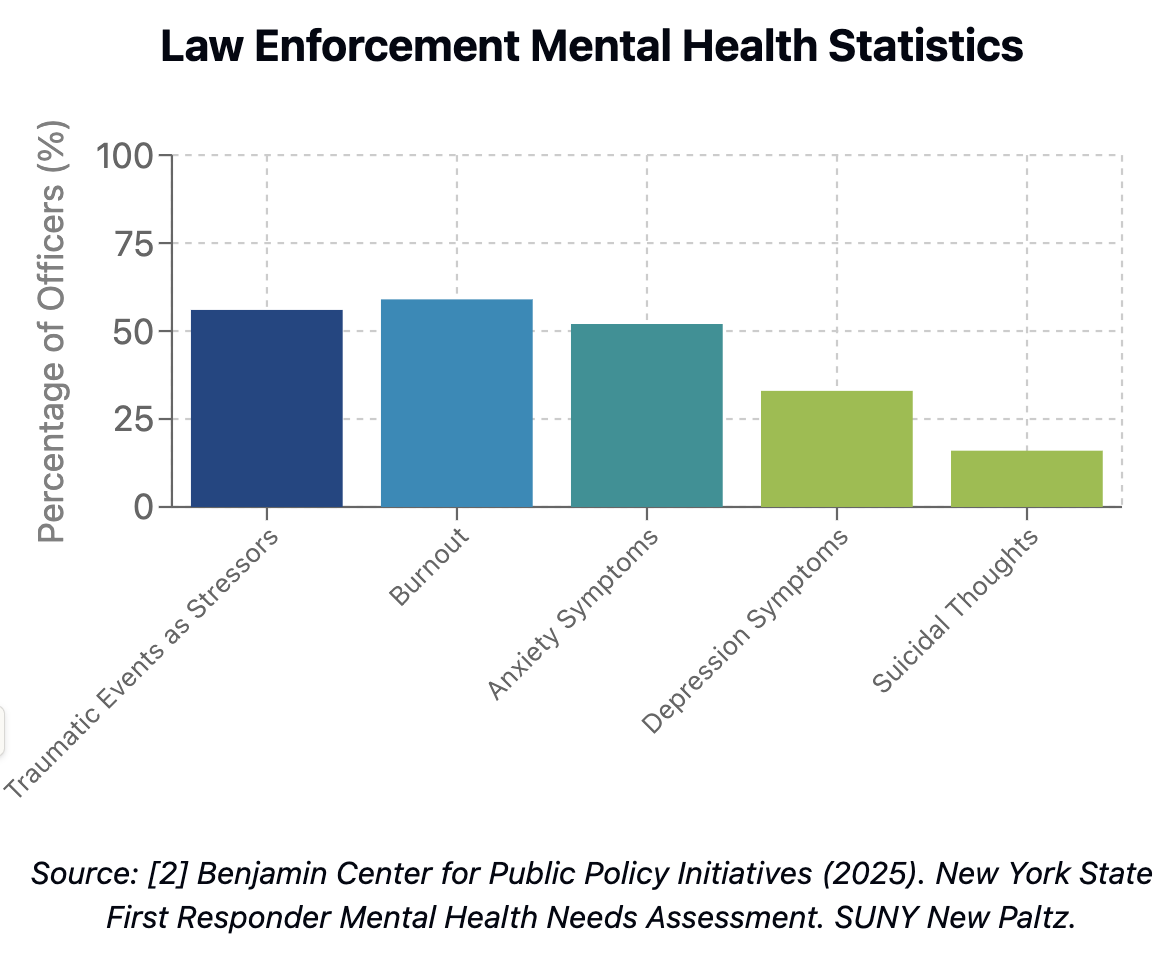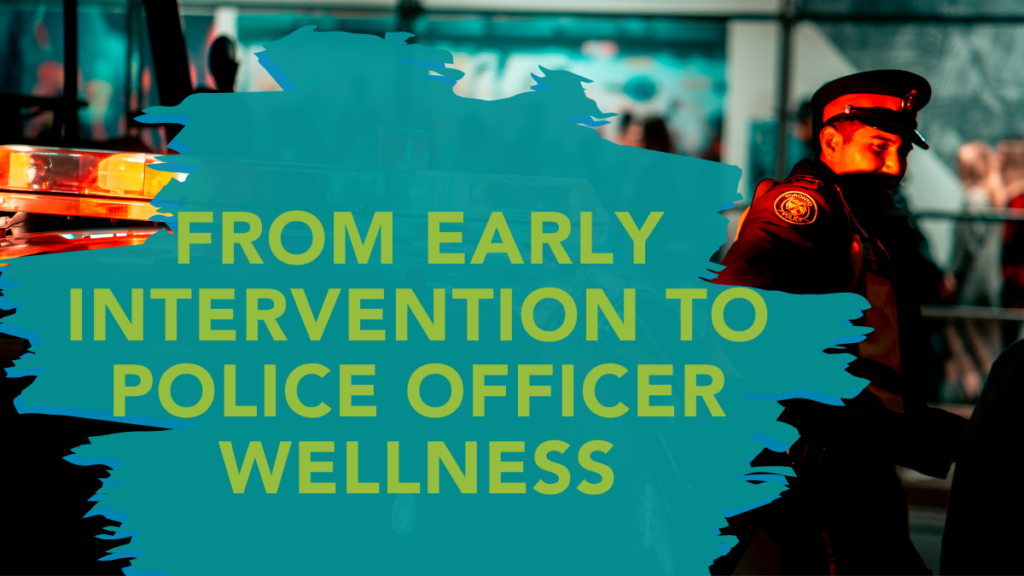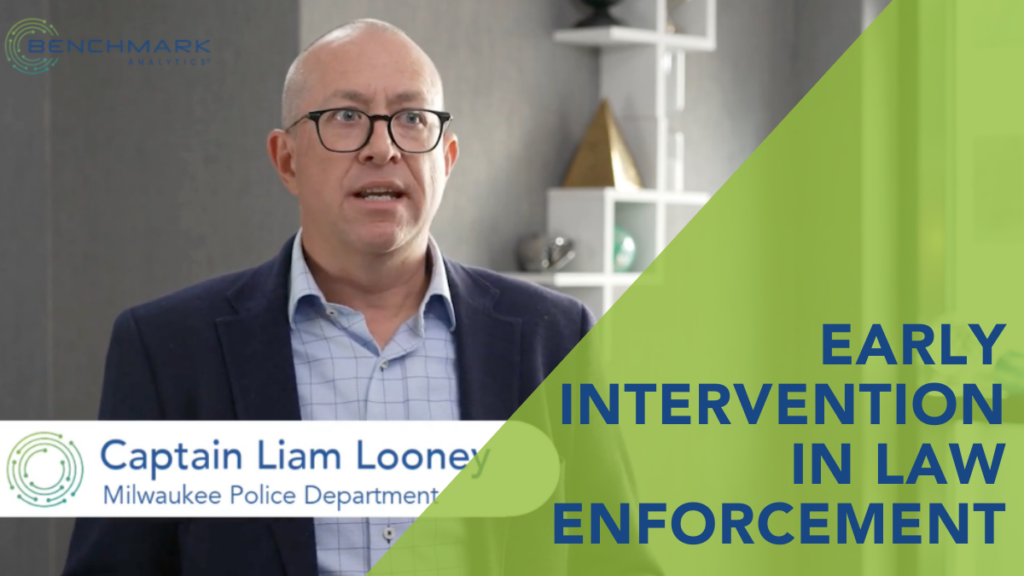The Next Evolution in Proactive Wellness: Enhancing Programs with Data-Driven Solutions
Posted
March 28, 2025
Share:
In today’s law enforcement landscape, officer wellness has become a top priority for agency leaders. Many departments have laid important groundwork with wellness initiatives, and now the next evolution is emerging: data-driven approaches that enhance and complement these existing programs.
Research shows that while 23% of agencies have implemented comprehensive wellness programs, 62% still offer no formal wellness programs at all [1]. For chiefs looking to improve existing programs or build new ones, understanding the difference between traditional approaches and data-enhanced solutions is crucial.
The Current State of Police Wellness
The mental health statistics for law enforcement highlight why wellness programs are so important:
- 56% of officers report experiencing traumatic events as stressors [2]
- 59% experience burnout, and 52% report symptoms of anxiety [2]
- 33% of officers experience depression symptoms [2]
- 16% report having experienced thoughts of suicide [2]
These numbers underscore why many departments have already implemented various wellness initiatives, providing an essential foundation for officer support.

Building on Traditional Approaches with Data-Driven Solutions
Current wellness approaches offer valuable support in several areas:
Traditional Proactive Approaches:
- Annual mental health check-ins provide regular touchpoints for wellness
- Stress management seminars offer important education and resources
- EAP programs create pathways to professional support
- Peer support networks leverage the unique understanding of fellow officers
- Physical fitness programs help officers maintain overall health
These programs deliver tangible benefits and have helped countless officers. The challenge is that they face certain limitations that data-driven approaches can help address:
Areas for Enhancement:
- Access barriers: Despite available resources, practical issues like scheduling conflicts (72% cite this as a barrier) and lack of time (78%) often prevent utilization [2]
- Identification challenges: Many officers don’t recognize when they need help (78% report this as a barrier) [2]
- Cultural considerations: Finding mental health providers who understand police culture remains difficult (75% report this as a significant barrier) [2]
How Data-Driven Approaches Complement Existing Programs:
- Uses existing data sources to identify officers experiencing trauma exposure and fatigue
- Applies research-based algorithms to detect patterns indicating potential mental health risks
- Provides targeted interventions based on specific officer needs
- Supports supervisors with guided tutorials and clinical resources
These enhanced approaches don’t replace traditional programs – they strengthen them by ensuring resources reach those who need them most.
The Science Behind Effective Wellness Programs
The Seattle Trauma Study provides exciting evidence for how research-based approaches can enhance wellness initiatives. This randomized control trial showed that effective fatigue management training produced remarkable results:
- 18 minutes of additional sleep per night for officers
- 50% reduction in self-reported PTSD symptoms
- 33% reduction in anxiety symptoms
- 45% reduction in incidents of falling asleep while driving [3]
These outcomes demonstrate how evidence-based interventions can strengthen existing wellness programs by targeting specific needs with proven techniques.
The ROI of Enhanced Wellness Programs
For chiefs considering investments in officer wellness, the return is substantial:
- Reduced healthcare costs of approximately $1,179 per officer annually
- Significant savings on the $190,000+ cost of replacing an officer who leaves the profession
- Improved decision-making and reduced liability from excessive force complaints [4]
These financial benefits complement the primary goal: supporting officer health and well-being.
Building a Comprehensive Wellness Strategy
One officer quoted in the Benjamin Center study noted:
“There’s a cultural barrier to getting outside mental health help in the first responder community… there is the cultural suppression of males expressing feelings in a male-dominated field.” [2]
This cultural reality means the most effective wellness approaches combine:
- Traditional support structures that build trust and provide basic resources
- Data-driven tools that help identify officers who might benefit from additional support
- Culturally competent providers who understand the unique stressors of policing
A chief from a mid-sized department recently shared: “Our traditional wellness programs laid important groundwork, but adding data-driven tools has helped us better target our resources and reach officers who might otherwise fall through the cracks.”
Conclusion
The next evolution in officer wellness isn’t about replacing existing programs – it’s about enhancing them with data-driven approaches that ensure resources reach those who need them most. By building on the foundation of current wellness initiatives and adding precision tools, departments can create comprehensive support systems that truly make a difference in officer wellbeing.
As agencies continue to face recruitment and retention challenges, investing in enhanced wellness solutions is essential for maintaining both officer health and effective police services for our communities.
References
[1] Taylor, B. G., Liu, W., & Mumford, E. A. (2021). A national study on the availability of law enforcement agency wellness programming for officers. International Journal of Police Science & Management, 24(2), 175-189.
[2] Benjamin Center for Public Policy Initiatives (2025). New York State First Responder Mental Health Needs Assessment. SUNY New Paltz.
[3] James, L., James, S., & Atherley, L. (2024). Evaluating the effectiveness of a fatigue training intervention for the Seattle Police Department: Results from a randomized control trial. Journal of Experimental Criminology.
[4] The ROI of Investing in Officer Wellness Programs (2025).
Related Posts
Ready to Experience the Benchmark Difference?
Benchmark Analytics and its powerful suite of solutions can help you turn your agency’s challenges into opportunities. Get in touch with our expert team today.



